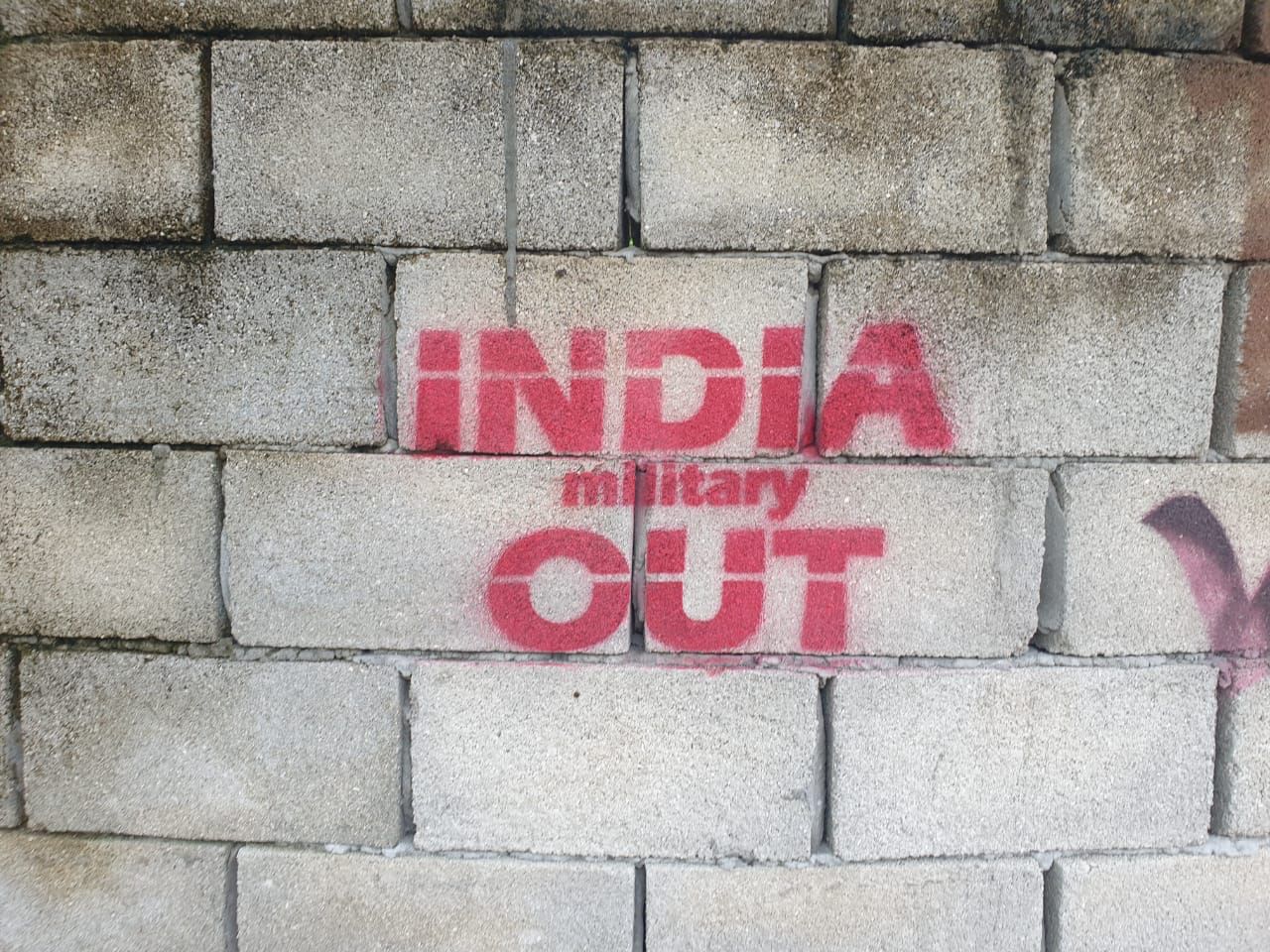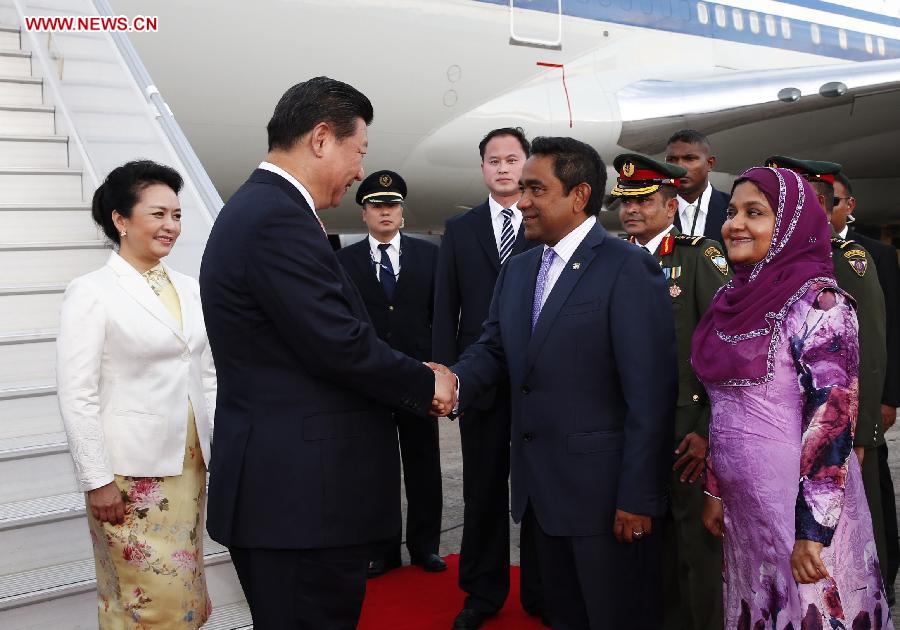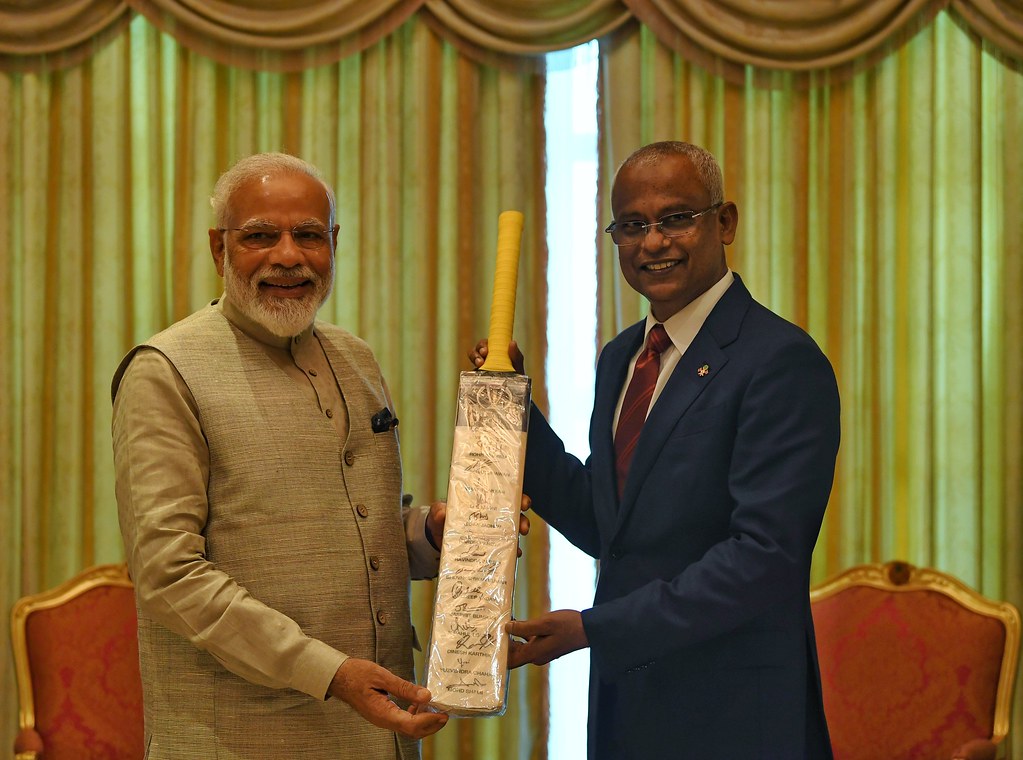An opposition-led “India out” campaign in the Maldives has come as a big embarrassment for the island nation, which has traditionally maintained close ties with New Delhi.
The ruling Maldivian Democratic Party (MDP) has prepared draft legislation to combat the anti-India slogans that are echoing in the Indian Ocean archipelago. MDP’s parliamentary group has agreed to introduce a bill in the House.
The MDP’s predecessor, the Progressive Party of Maldives (PPM), was known for its pro-China tilt. Former President Abdulla Yameen has become the public face of anti-Indian protests in the Maldives since his release from house detention in November last year, prompting the ruling lawmakers to race to quell a diplomatic storm.

The bill, which is scheduled to be introduced early in the current session of the 87-member assembly, has punitive language intended at political movements that endanger the country’s foreign ties. According to local media, jail periods and home arrest are among the proposed penalties.
“This bill seeks to criminalize activity that can harm our international relations,” Imthiyaz Fahmy, parliamentarian and spokesperson for the ruling Maldivian Democratic Party, told Nikkei Asia. “There has been concern within the government and the MDP about the ‘India Out’ campaign hurting ties with a close friend and neighbor who has helped us many times.”
Because of the MDP’s resounding victory in the 2019 elections, Fahmy expects little opposition to the law. President Ibrahim Mohamed Solih’s party has 64 parliamentarians in parliament, compared to the opposition’s 17 members, which includes five members of Yameen’s Progressive Party of Maldives.
Another "IndiaOut" event took place on Friday evening in Raa atoll Meedhoo. A large throng from the local island has joined the gathering to chant against Indian military deployment in various regions of our country. Yameen, the campaign's major figure and former president
1/3 pic.twitter.com/uzB93sw320— Lujain (@lujeinmv) February 11, 2022
The anti-India campaign, which has gained traction in recent months, thanks to Yameen and his Progressive Party’s involvement, claims that large numbers of Indian military personnel are stationed in the Maldives and that the government intends to hand over the Uthuru Thilafalhu atoll to the Indian Navy.
During the visit of External Affairs Minister S Jaishankar in February 2021, India and the Maldives had signed an agreement for the development of the UTF Harbour to boost Male’s Coast Guard Capability and enhance their bilateral relationship. However, it has been weaponized by the opposition to rally against India.
India's Defence Secretary Dr Ajay Kumar @drajaykumar_ias is in Maldives & made a courtesy call to Maldives Defence minister Mariya Didi @MariyaDidi. Maldives readout states that minister Didi "expressed deep appreciation for the Coast Guard Dockyard project". pic.twitter.com/uQyIbeI64n
— Sidhant Sibal (@sidhant) February 13, 2022
The “India Out” campaign also targets military aircraft handed over to the Maldives by the Indian government. The Maldives had received a Dornier aircraft from India to help them improve surveillance over their exclusive economic zone and keep an eye on sea-borne terrorists. The Maldives National Defense Force is in charge of the aircraft.
A Dornier 228, Maritime Surveillance and Reconnaissance aircraft was presented to the Govt of Maldives from the Government and People of India which arrived Maldives earlier today.
A HAL Dhruv was earlier commissioned in service of the Maldivian Coast Guard, in 2013 pic.twitter.com/eLy1vBCwbv— Delhi Defence Review (@delhidefence) September 29, 2020
This campaign has also caused trouble for Indians living in the Maldives. In the course of this protest gathering steam, teachers from India were targeted by people shouting ‘India Out’ slogans on two distinct islands.
The draft bill which allegedly aims to defuse the campaign is being touted as essential by the ruling MDP government. However, the Solih government’s progressive credentials are now being called into doubt, as MDP members resort to open censorship to combat the anti-India campaign. The recent arrests of Yameen’s supporters who attended “India Out” protests have sparked concerns about free speech.
Sensing an opportunity, Yameen’s PPM also issued a statement, days before the start of the new parliamentary session, claiming that the government has “adopted authoritarian measures to curtail rights of freedom of assembly and freedom of expression by brutal attacks at the hand of security forces and now through unconstitutional laws.”
Male’s Unease Over ‘India Out’ Campaign
“The Maldives has not had international affairs dragged into domestic politics on this scale,” said a diplomat from an Asian country. “President Solih’s political allies will have to handle this sensitive issue carefully.”
Yameen, on the other hand, has added a geopolitical fault-line between his pro-China side and Solih’s pro-India camp, further dividing the country’s politics. He’s been showing up at rallies in cities all around the archipelago, reported Nikkei Asia.
Anti-India protests have been ongoing in the Maldives for some time, and Yameen’s acquittal has further heightened them. The former President’s acquittal was expected to have an influence on relations between the Maldives and India, especially given his outspoken support for the demonstrations.

The ruling party has accused Yameen and the PPM of being pro-China, and several of Yameen’s initiatives during his term have indicated his preference for China and Saudi Arabia.
A photo of supporters of the ‘India Out’ movement outside the entrance of the Chinese embassy in the Maldives went viral in mid-December last year, with the supporters wearing their trademark red T-shirts with the words ‘INDIA OUT’ emblazoned on them.
The Chinese embassy responded to the criticism a day later on Twitter, saying they “always follow the principle of non-interference into the internal affairs of other countries.”
Political analysts in the Maldives believe Yameen’s anti-India rhetoric is a ploy to resurrect his political career following a humiliating defeat to Solih in 2018. His dictatorial government, which was characterized by massive corruption and a clear tilt toward China at the detriment of India, came to an end with the defeat, stated Nikkei Asia.
Last November, however, the Maldivian Supreme Court reversed Yameen’s money-laundering conviction, allowing him to leave house arrest.
#Maldives opposition parties coalition announces that they would expand the ongoing anti Indian protests under the leadership of former president Abdullah Yameen.#Yameen was recently released from house arrest after being acquitted in money laundering case. pic.twitter.com/vUdNJZzsjK
— Shraddha Nand Bhatnagar (@bauan_bhatnagar) December 22, 2021
New Delhi has been able to reclaim lost influence in the part of the Indian Ocean that it had long considered its backyard, thanks to the Solih administration’s pro-India stance, which is what the Yameen led “India out” campaign is challenging.
The current campaign is a follow-up of Yameen’s ‘December 23 Movement’ protests in 2011–12, which resulted in President Nasheed’s ouster on the one hand, and the cancellation of India’s GMR Group’s infrastructure projects on the other, according to Observers Research Foundation.
Yameen had steered the Maldives away from its longtime ally India and toward China, attracting investment through Beijing’s Belt and Road Initiative. Former President Mohamed Nasheed, who was living in exile in Sri Lanka at the time of the election of 2019, stated that up to 80% of the country’s foreign debt was owed to China.
China denies grabbing land in Maldives, calls former president Mohammad Nasheed’s claims ‘groundless’ https://t.co/LDEYj63opu pic.twitter.com/jelfyFYR6r
— The Daily Pasban – English (@dailypasban_eng) February 13, 2018
Solih’s party had promised voters in the run-up to the elections that it would look into China’s debts, which it believed might be worth $3 billion.
Detailed map on Chinese investments in the Maldives pic.twitter.com/ae9sz9hevm
— Manjeet Kripalani (@ManjeetKrip) February 17, 2018
Further, the increased Chinese investments and BRI designs in the Maldives during Yameen’s presidency had made India nervous, as Delhi has traditionally been the net security provider in the Indian Ocean region, a position that Beijing has been trying to challenge.
All of this must also be viewed in the context of the Maldives’ domestic politics. The Maldives will hold presidential and legislative elections in 2024, and it is a strategically significant country for both India and China. The latter has been striving to assert influence in the region and the wider Indian Ocean.
“The draft law is just a measure to assuage Indian concerns. The [anti-India] campaign has been going on for a while and the sentiment in India would be to stop it somewhere, somehow. Like it did in Sri Lanka, China could make statements like a third country should not interfere in ties between itself and Maldives in response to the law if it is passed. However, it will not withdraw investments from the Maldives and that’s what the latter wants,” S.D. Muni, Professor Emeritus at the School of International Studies at the Jawaharlal Nehru University and former Indian Ambassador and Special Envoy told The EurAsian Times.
“The legislation would thus help the Maldives pacify Indian concerns while not putting any major benefit at stake. The Indian policymakers certainly need to be careful in what message they send across in the Maldives,” he adds.

India-Maldives Ties
After the Maldives gained independence in 1965, India was one of the first nations to recognize it and establish diplomatic relations with it. India-Maldives ties have rekindled in several ways since Solih’s victory last year.
In November, Indian Prime Minister Narendra Modi paid a visit to the Maldives for Solih’s inauguration, and in December, he hosted Solih in New Delhi on his first foreign trip since entering office.
Modi also offered a $1.4 billion financial package for the Maldives, which had closed all areas of trade to India under Yameen. India’s partnership is a strategic imperative for Male for several reasons, the most important of which is that New Delhi has been a generous neighbor and the first responder to crisis in the Maldives.
India’s prime minister announces $1.4 billion financial aid to Maldives – The Indian Wire https://t.co/2V6tPcumGP
— The Indian Wire (@theindianwire) December 17, 2018
Mohamed Nasheed, the MDP’s leader and former president, had said that it was becoming more and more crucial that the MDP remains in government, as reported by The Hindu.
“There is a lot of bad blood, especially with President [Abdulla] Yameen, and his campaign and narrative against India that is making our people very uneasy”. He described India as Maldives’ “first port of call for assistance”.
India has indeed been the first responder and the primary support for the Maldives, whenever it was faced with a crisis. When the entire world was ravaged by the Covid-19 pandemic, India promised a five-pronged package in 2020, including $500 million in infrastructure, a direct freight ferry service, the establishment of an air travel bubble, the supply of critical commodities, and $250 million in further financial aid to support the cash-strapped economy of the Maldives.
India has provided emergency help to the Maldives on numerous occasions over the years. When armed mercenaries staged a coup against President Maumoon Abdul Gayoom in 1988, India dispatched paratroopers and Navy ships as part of ‘Operation Cactus’ to restore the legitimate government. India also rushed aid in the wake of the 2004 tsunami and during the water crisis in Male a decade later.
India provided a budget support aid of Rs 10 crore in view of the serious financial difficulties being faced by the Maldives on account of the tsunami and related factors.
- Contact the author at sakshi.tiwari9555@gmail.com
- Follow EurAsian Times on Google News




